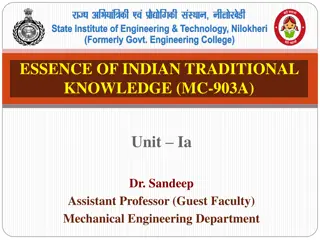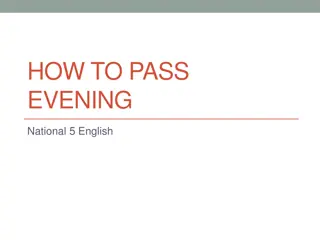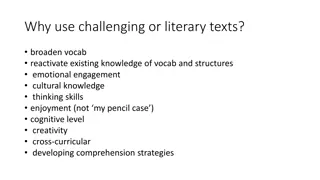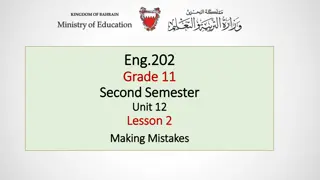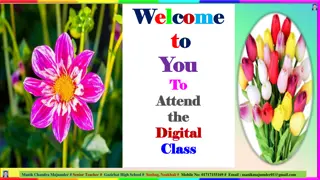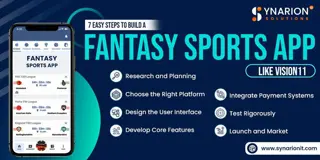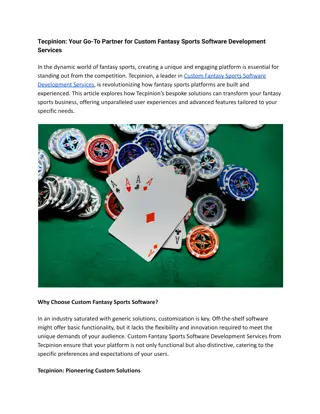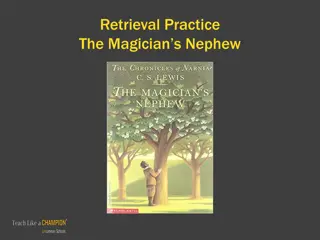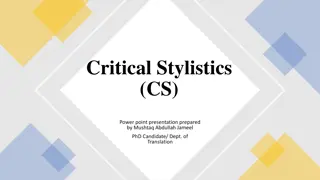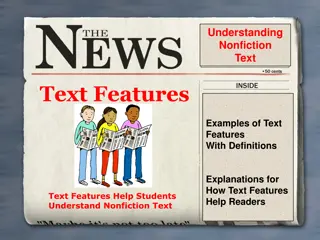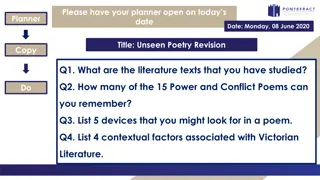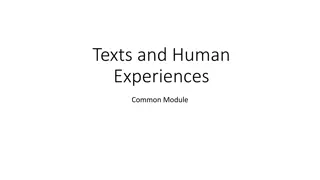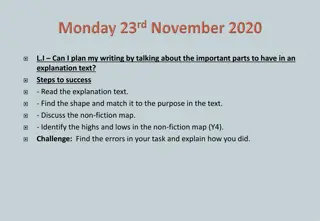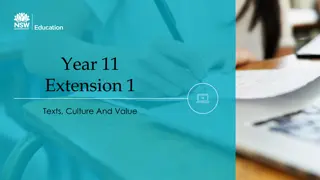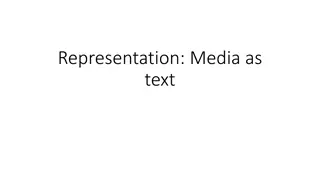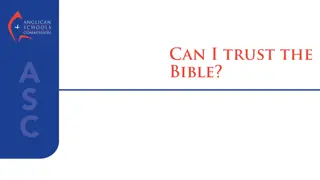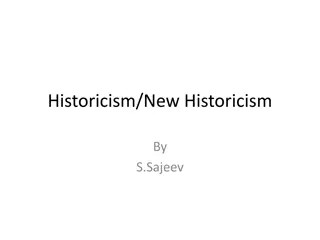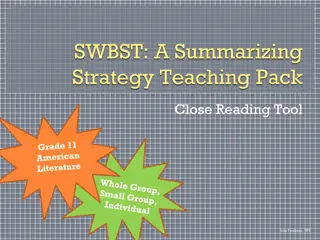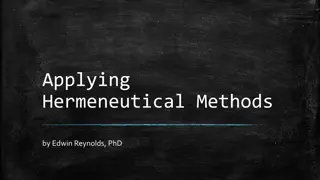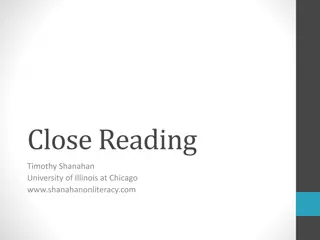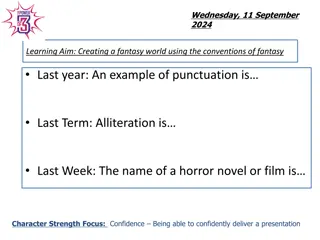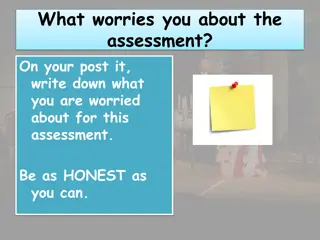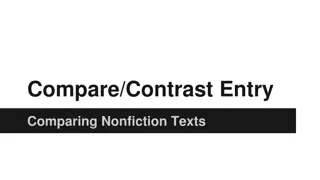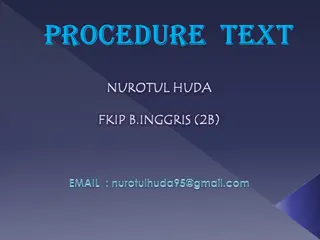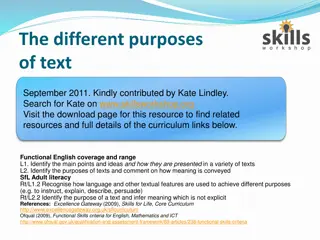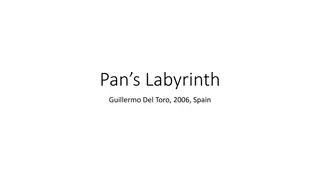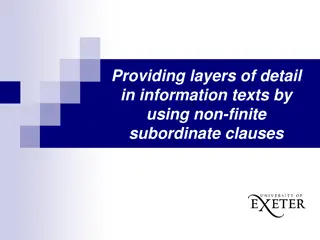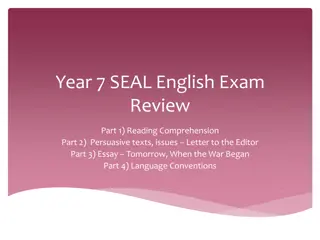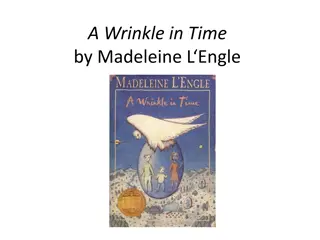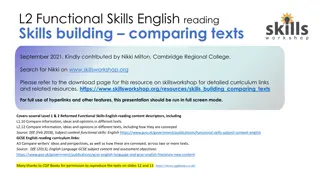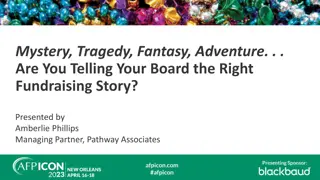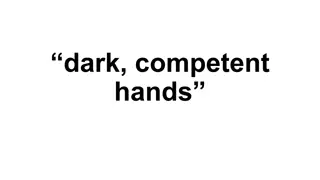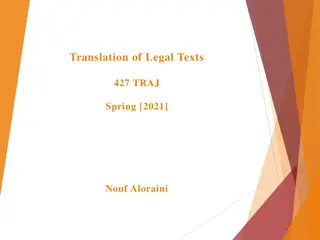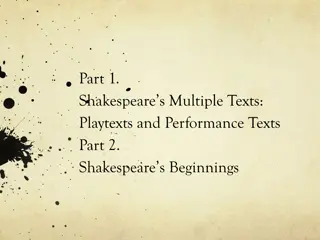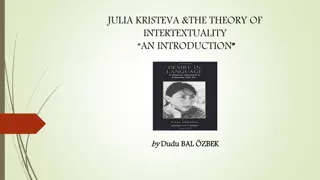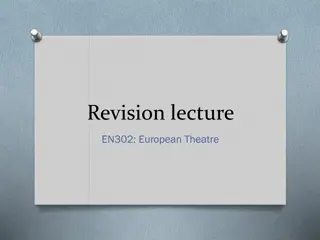Reading Opportunities at Branston Junior Academy
Discover a diverse range of reading opportunities at Branston Junior Academy for students in Year 3/4 and Year 5/6. The curriculum includes works by female and BAME authors, non-fiction, classics, and texts that challenge stereotypes. Students explore a variety of genres through engaging books like
0 views • 4 slides
Medieval English Texts: Cotton MS Nero A.X/2 and Sir Gawain and the Green Knight
Explore the rich literary realm of Medieval English texts through manuscripts like the Cotton MS Nero A.X/2, containing alliterative poetry in Middle English, featuring works like Pearl, Patience, Cleanness, and Sir Gawain and the Green Knight. Delve into the world of Sir Gawain and the Green Knight
0 views • 27 slides
The Essence of Indian Traditional Knowledge: Vedic Culture and History
The Vedas, ancient religious texts of Hinduism, provide essential knowledge about existence and the divine. Believed to have always existed, they were orally transmitted before being written down between 1500-500 BCE in India. The Vedas are considered among the oldest religious works and are categor
1 views • 41 slides
National 5 English Course Overview and Assessment Details
This National 5 English course covers detailed text analysis, critical essay writing, individual presentations, and group discussions. Students will study Scottish texts, genre texts, and non-fiction for understanding, analysis, and evaluation. Assessment includes internal assessments and a final ex
1 views • 20 slides
Enhancing Language Skills Through Challenging Literary Texts
Broaden vocabulary, reactivate knowledge, and engage emotionally with challenging literary texts to develop comprehension strategies, cultural awareness, and cognitive skills. Utilize various media sources and explicit instruction to access more complex texts, fostering creativity and cross-curricul
4 views • 28 slides
Recognizing Mistakes in Reading Texts - Eng.Eng.202 Grade 11 Lesson 2
In this lesson, students learn to extract specific information from reading texts related to mistakes. They identify collocations in the context of mistakes and learn about the third conditional. The lesson includes engaging paragraphs about individuals making various mistakes, prompting critical th
1 views • 15 slides
Enhancing Emotional Connection Through Literary Texts
Join Senior Teacher Manik Chandra Majumder at Gazirhat High School to explore Competency 4, focusing on emotionally connecting with literary texts. Engage in expressing personal feelings about literature and learn new vocabulary to enhance understanding. Dive into a world of universal themes and mea
1 views • 46 slides
7 Easy Steps to Build a Fantasy Sports App Like Vision11
Discover the straightforward process of fantasy sports app development with these 7 easy steps. Emulate the success of popular platforms like Vision11 by conducting thorough research, designing a user-friendly interface, and integrating essential features. Ensure seamless navigation, live match upda
2 views • 1 slides
Elevate Your Game with Tecpinion's Custom Fantasy Sports Software Development Services
Unlock the full potential of your fantasy sports platform with Tecpinion's Custom Fantasy Sports Software Development Services. Tailored to meet your unique requirements, Tecpinion offers a comprehensive suite of solutions designed to enhance user engagement, streamline operations, and drive busines
1 views • 3 slides
Analysis of Fantasy Elements in "The Magician's Nephew" & Victorian Gender Roles
Explore the fantasy genre in "The Magician's Nephew" with a focus on elements like intrusive narration, allusions, and suspense. Delve into how C.S. Lewis's life influenced the novel. Discover Victorian gender roles through concepts like separate spheres and class distinctions. Unveil literary terms
0 views • 13 slides
Understanding Critical Stylistics: Tools and Application
Critical Stylistics (CS) is a method that delves into the ideological underpinnings of texts through the analysis of linguistic features. Developed by Jeffries, CS focuses on uncovering implicit ideologies embedded in texts by examining stylistic choices. By integrating stylistics and critical disco
2 views • 28 slides
Understanding Text Features in Nonfiction Texts
Text features are essential components of nonfiction texts that authors use to enhance reader comprehension. They include elements such as tables of contents, indexes, glossaries, and titles, each serving a unique purpose in aiding readers to navigate and understand the content. By utilizing these t
1 views • 15 slides
Unseen Poetry Revision: Exploring Literary Texts, Devices, and Contexts
Delve into the world of unseen poetry revision by analyzing literary texts, exploring poetic devices, and understanding contextual factors associated with Victorian Literature. Engage in vocabulary challenges, pre-reading activities, and discussions to enhance your understanding of poetry. Enhance y
3 views • 24 slides
Exploring Human Experiences Through Texts and Films
Dive into a journey of understanding human experiences through texts, films, and reflective writing activities focusing on identity, compassion, and representation. Engage with thought-provoking questions and a prescribed text to explore the essence of being human.
1 views • 27 slides
Mastering the Art of Writing Explanation Texts
Learn how to effectively plan and write explanation texts by focusing on important elements, understanding non-fiction writing, and gaining insights on structuring your content. Dive into a detailed guide on shaping your explanations and exploring topics like the water cycle or iRobot Cats. Be prepa
1 views • 11 slides
Exploring Texts, Culture, and Value Through Appropriation
In Year 11 Extension 1, students delve into texts from the past and their influence on present culture. They analyze the relationships between texts and culture, language's impact on values, and different responses to texts. Through close study, they explore key texts from the past, examining how th
0 views • 9 slides
Understanding Representation in Media Studies
Representation in media studies refers to how aspects of society such as gender, age, ethnicity, and identity are presented to audiences through media texts. These texts have the power to influence ideas and attitudes by shaping the audience's understanding of important topics. Analyzing media texts
1 views • 19 slides
Examining the Reliability of Historical Texts: From The Bible to Socrates
Investigating the unparalleled popularity of the Bible, the historical significance of Christianity, the reliability of documents related to Socrates, and the critical analysis of potential mistakes in historical texts through comparisons and archaeological findings.
2 views • 13 slides
Exploring Historicism and New Historicism: Perspectives on History and Literature
Understanding Historicism and New Historicism, this article delves into their definitions, perspectives on history, treatment of literary and non-literary texts, examples, and the emergence of New Historicism in the 1980s. It explores how these approaches unify cultural and social texts, challenge t
0 views • 16 slides
SWBST Summarizing Strategy Teaching Pack Overview
SWBST is a summarizing strategy designed by Julie Faulkner to help readers comprehend texts effectively. It entails breaking down texts into key components: Somebody (main character/speaker/author) Wanted (motivation), But (problem/conflict), So (solution), Then (resolution). The strategy aids in hi
0 views • 18 slides
Comparative Hermeneutics: Understanding Biblical Texts
Explore the application of hermeneutical methods on biblical texts such as Psalm 23 and 1 Tim. 2 through interpretation, translation, and contextual analysis. Delve into the meaning of texts, the role of signs and symbols, and the impact of varying presuppositions on interpretation. Reflect on the p
0 views • 46 slides
GCSE English Literature Exam Overview
This overview provides information on the GCSE English Literature exam structure, content, and assessment objectives for both components. It includes details on the texts studied, such as Shakespeare, poetry, post-1914 prose/drama, and 19th-century prose. Students are assessed on their ability to re
0 views • 23 slides
GCSE English Literature Exam Overview
This GCSE English Literature exam overview provides details on the components, assessment objectives, text choices, and key information for students. It covers Shakespeare, Poetry, Post-1914 Prose/Drama, 19th Century Prose, and Unseen Poetry. Students will engage with a variety of texts ranging from
5 views • 23 slides
Understanding Close Reading: A Historical Perspective
Close reading is not just a teaching technique; it is a goal focused on helping children read texts closely. This approach involves analyzing texts deeply to derive meaning directly from the content, without relying heavily on external sources. With roots in history, close reading has evolved to cha
0 views • 52 slides
Exploring Fantasy Worlds: Conventions, Types, and Challenges
Dive into the realm of fantasy literature and learn about the conventions, types, and differences between fantasy and sci-fi. Uncover the definition of fantasy, explore popular genres, and discover sub-genres like fiction, science fiction, and historical fiction. Engage in thought-provoking challeng
0 views • 17 slides
Literature Assessment: Understanding Modern Texts and Poetry
This assessment focuses on modern texts, poetry, and unseen poetry, evaluating students' ability to analyze literary works and demonstrate understanding. Students must be prepared to write essays and respond to various types of questions within a time limit. Key areas covered include Sheila's charac
0 views • 16 slides
Analyzing Nonfiction Texts: Comparing Structures and Evidence
Explore how two nonfiction texts, "Watch Your Driving, Kids" and an Allstate Foundation video, present statistics on teen car crashes and propose solutions. Dive into the authors' text organization and credibility, unveiling similarities in the texts' structures and evidence presentation.
0 views • 10 slides
Understanding Procedure Texts and their Structure
Procedure texts are instructional pieces of writing that explain how something works or how to perform a specific activity. They typically consist of three main definitions: texts that explain how to use something, texts that provide instructions for a particular activity, and texts that address hum
0 views • 10 slides
Understanding the Various Purposes of Texts
Explore the diverse functions of texts and how they convey meaning, from spooky holiday advertisements to cooking instructions and flu immunization details. Discover how language and textual features are used to achieve different purposes, and learn to identify implicit meanings in texts. Enhance yo
0 views • 9 slides
Analysis of Themes and Representations in Pan's Labyrinth by Guillermo Del Toro
Pan's Labyrinth, directed by Guillermo Del Toro, delves into the complex themes of fascism, good versus evil, childhood innocence, reality versus fantasy, gender representations, family dynamics, politics, and nationality in the backdrop of post-war Spain. The film intricately weaves together elemen
0 views • 10 slides
Enhancing Information Texts with Non-Finite Subordinate Clauses
Providing layers of detail in information texts involves using non-finite subordinate clauses to establish connections between grammar, meaning, and rhetorical effects. The LEAD principles emphasize linking grammar to writing purposefully, using authentic texts as models, and fostering deep metaling
0 views • 8 slides
Exploring Fantasy Texts: The Raven and Literary Devices
Delve into the world of fantasy texts by analyzing "The Raven" by Edgar Allan Poe. Explore how characters, relationships, and traditional versus contemporary elements are challenged, conveying powerful messages to readers. Consider literary devices like similes, imagery, and personification to under
0 views • 55 slides
Exploring 'A Wrinkle in Time' by Madeleine L'Engle: Author, Themes, and Genre
Delve into the world of "A Wrinkle in Time" by Madeleine L'Engle, a timeless classic that combines elements of science fiction and fantasy. Discover the life of the author, Madeleine L'Engle, her inspirations, and the essential questions raised in the novel. Explore themes of love, fear, empowerment
0 views • 24 slides
Enhancing Reading Skills: Comparing Texts for English Learners
Enhance your English reading skills by comparing texts to identify similarities and differences. Practice analyzing information, ideas, and opinions in different texts, including how they are conveyed. This resource provides exercises and examples to help you develop your ability to compare and cont
0 views • 14 slides
Crafting Your Effective Fundraising Story for Board Engagement
Explore the different storytelling approaches - Mystery, Tragedy, Fantasy, Adventure - to assess if your fundraising narrative resonates with your board. Learn to identify key elements shaping your story, tools to enhance your communication, and action steps for strengthening fundraising strategies.
0 views • 23 slides
Analysis of Word Choices and Attitudes in Literary Texts
The provided content delves into the representation of characters through word choice and attitudes in various literary texts. It examines the implications behind phrases like "dark, competent hands" and "Mandy got her degree, did she? Dog my cats", shedding light on underlying biases and perspectiv
0 views • 16 slides
Translation of Legal Texts Course Overview
This course provides a comprehensive overview of translating legal texts from English into Arabic and vice versa. Students will explore various types of legal texts, specialized terminology, and resources essential for accurate translation. The course covers the history of legal discourse, emphasizi
0 views • 50 slides
Understanding Shakespeare's Playtexts and Performance Texts
Dive into Shakespeare's world of multiple texts, exploring the nuances between playtexts and performance texts. Discover the collaborative nature of early modern playwriting and the significance of deciphering performance elements in comprehending his works. Unveil the intersection of written words
0 views • 9 slides
Julia Kristeva & the Theory of Intertextuality: An Introduction
In this introduction to Julia Kristeva's theory of intertextuality, we explore her concept of texts as intersections of various writings rather than fixed points of meaning. Kristeva argues that texts are composed of prior existences, forming a mosaic of quotations and transformations. Intertextuali
0 views • 25 slides
Exam Rubric and Guidelines for European Theatre Module
The content discusses important information regarding the exam rubric for the European Theatre module, including guidelines on time limits, permitted topics, penalties for violations, and advice on handling exam questions. It clarifies rules on writing about the same texts as in coursework essays, s
0 views • 29 slides


